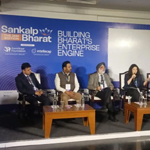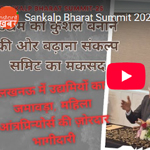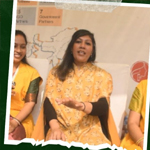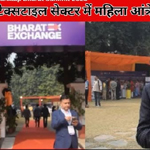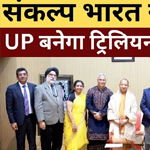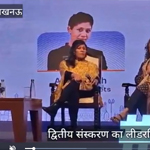In an interview with Economic Times at the 2nd Edition of the Sankalp Bharat Summit 2025 in Lucknow, Vikas Bali, CEO, Intellecap highlighted how “India doesn’t need borrowed solutions; it needs local problem-solvers“.
As India’s growth story increasingly shifts beyond metropolitan cities, impact investing platform Sankalp Bharat’s recent summit in Lucknow highlighted the importance of tier II and tier III cities, small businesses, and locally rooted entrepreneurs in building a resilient, inclusive economy.
The 2nd Sankalp Bharat Summit emphasized the need for home-grown, contextualized solutions for India’s local problems, particularly in agriculture, climate, and waste management. Hosted by Aavishkaar Foundation and Intellecap, the summit held last month in Lucknow brought together entrepreneurs, investors, policymakers, and ecosystem builders to deliberate on climate adaptation, agri-value chains, circular manufacturing, AI for impact, and women-led growth.
On the sidelines of the summit, Vikas Bali, CEO of Intellecap, highlighted why India needs home-grown problem-solvers, patient capital, and a mindset shift in investing.
The full interview below:
ET: For the second consecutive year, Sankalp Bharat was held in Uttar Pradesh (UP). Why was Lucknow chosen, and what does the decision indicate about India’s broader growth ambitions?
Vikas Bali (VB): This is our 37th Sankalp event globally. We have held 15 editions across different parts of India, 12 in Nairobi, three in Dhaka, and others in Accra and The Hague. This is our second summit in UP, after the one in Varanasi last year. The reason is simple: if India has to grow, tier II and tier III towns must grow.
Equally important, MSMEs (micro, small, and medium enterprises) and entrepreneurs solving local problems must scale. India does not just need AI (artificial intelligence) solvers or Silicon Valley-style start-ups; we need problem-solvers in agriculture, climate, healthcare, waste management, and livelihoods. These solutions must be home-grown and contextual; borrowing Western answers for Indian problems will not work. Capital, ecosystems, and innovation must be rooted where the problems exist
ET: What are the biggest challenges entrepreneurs from smaller cities face when trying to scale their businesses?
VB: The first challenge is a mindset issue, particularly within the investment community. Venture capital is often driven by exits, short timelines, and rapid scale. But businesses solving grassroots problems are not software- or service-led models; they are bricks-and-mortar enterprises solving healthcare gaps in rural areas or climate challenges for farmers. These models scale steadily over time, not overnight.
The second thing is, from an entrepreneur’s standpoint. They need to start speaking the language that the other person understands. Ultimately, if you want to seek an investment, then you need to comply with the broad contours of what the investor is looking for. So, we have to change the narrative. Our role is to bridge this gap—to translate investor expectations while ensuring entrepreneurs don’t lose sight of their core mission.
ET: How does Aavishkaar’s own journey shape its approach to ecosystem building?
VB: Aavishkaar is a home-grown organisation. We started 23 years ago as an Indian investment and ecosystem-building platform. We are deeply rooted in the Global South. Unlike firms that bring external ideas into India, we have taken Indian ideas to other parts of the world.
We expanded Sankalp to Nairobi over a decade ago, then to Bangladesh and Ghana. As an advisory business, we have worked across markets—from Indonesia to Mexico. While we export best practices from India, we also learn from the diversity of these markets. Africa, for instance, has very different business models and entrepreneurial energy compared to India. These learnings strengthen how we build ecosystems back home.
ET: How does India’s entrepreneurial ecosystem compare with other developing markets?
VB: India has inspired many emerging markets by demonstrating that scale is possible. The rise of unicorns has created a strong aspirational pathway, showing that large outcomes can be achieved. This kind of aspiration and visibility is still missing in many parts of the developing world, where ecosystems are still taking shape.
Another key difference is market size. India’s population of 1.4 billion provides a large, concentrated consumer base. Entrepreneurs in other regions operate in smaller and more fragmented markets, which limits their ability to scale. This combination of ambition, scale, and entrepreneurial energy gives India a distinct advantage.
ET: Sankalp Bharat focused on climate, circularity, and women-led growth. Why are these areas critical now?
VB: Ecosystem building goes beyond hosting conferences. It means creating an entrepreneurial culture, bringing developmental capital closer to innovation, and linking private sector needs with what entrepreneurs are building.
Value from waste is a major priority. India generates enormous amounts of waste, and extracting economic value from it is essential. Climate change is already impacting farmers and MSMEs, making resilience unavoidable. Decarbonising supply chains is another urgent need from both environmental and business perspectives.
Women’s economic empowerment is equally important. While progress has begun, it remains limited. Scaling women-led enterprises is essential not just for equity but for long-term economic resilience.
ET: How does Sankalp Bharat translate these conversations into tangible outcomes for entrepreneurs?
VB: Sankalp is action oriented. Through pitch sessions, business deal rooms, and awards, we connect entrepreneurs to capital, markets, and partnerships. But our work extends beyond the summit.
Read more –https://ow.ly/HqIs50XVfIh







